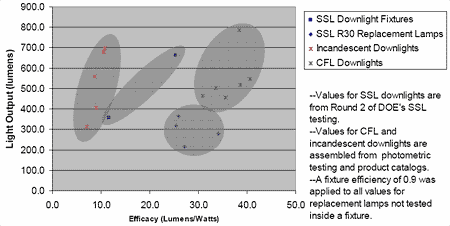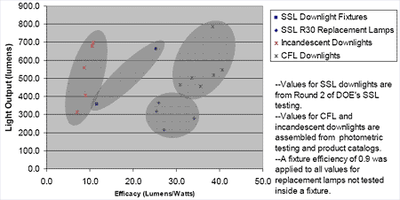U.S. Department of Energy publishes final report on SSL efficacy for todays products
DoE SSL luminaries test shows a huge discrepancy between manufacturer claims and actual tested luminaire performance. Numerous products for differnt applications were tested in three rounds. To give consideration to real-life conditions off state power consumption (standby power) was taken into account. Pilot test results were published in December 2006, first round results followed in March 2007. Now Final results are published for free distribution in the public interest for noncommercial, educational purposes.
Off state power consumption (standby power) was taken into account to give consideration to real live conditions.
Conclusions from Round 2 of Product Testing
Round 2 of the DOE’s testing of commercially available solid-state lighting products has revealed examples of both excellent and dismal performances. Some downlights and directional replacement lamps produce light output comparable to similar incandescent and CFL downlights, while significantly surpassing the incandescents and approaching the CFLs in efficacy. On the other hand, a number of non-directional replacement lamps (A-lamps) perform very poorly and do not produce enough light output to be suitable replacements for any similar products in use today. Refrigerated display case and outdoor wall lamps that were tested performed quite well, while SSL desk lamps still tend to compare poorly due to their use of power in the off-state. This vast divergence in applications and in product performance provides a key point to remember: any comparison between SSL products and luminaires using more traditional light sources should rely on specific performance data for the luminaires in question. Generalizations can provide an indication of the overall progress of SSL technology and markets, but should not be relied upon to make decisions regarding SSL luminaires.
SSL product performance cannot be easily generalized. The large divergence in performance characteristics means that buyers will need to consider the performance of each product separately and require clear (and accurate) luminaire performance information from manufacturers.
Unfortunately there is still a wide disparity between performance claims in marketing literature and actual tested luminaire performance. While a few manufacturers are publishing credible values for luminaire output and efficacy, many are still making wild and misleading claims.
About DOE SSL Commercial Product Testing Program:
The Program was established to serve public with reliable, unbiased product performance information to foster the developing market for high-performance SSL products.
The DOE SSL Commercial Product Testing Program will:
• Guide DOE planning for SSL R&D and commercialization support activities, including ENERGY STAR® program planning
• Support DOE technology procurement activities and associated technology demonstrations
• Provide objective product performance information to the public in the early years, helping buyers and specifiers have confidence that new SSL products will perform as claimed
• Guide the development, refinement, and adoption of credible, standardized test procedures and measurements for SSL products
DOE will support testing of a wide, representative array of SSL products available for general illumination, using test procedures currently under development by standards organizations. Guidelines for selecting products for testing will ensure that the overall set of tests provides insight on a range of lighting applications and product categories, a range of performance characteristics, a mix of manufacturers, a variety of LED devices, and variations in geometric configurations that may affect testing and performance.
Testing Program Reports:
The Department will allow its test results to be distributed in the public interest for noncommercial, educational purposes only. Detailed test reports will only be provided to users who provide their name, affiliation, and confirmation of agreement to abide by DOE's "No Commercial Use Policy." DOE encourages stakeholders to report any apparent commercial use of test results from the DOE SSL Commercial Product Testing Program by sending a message to doe.ssl.updates@ee.doe.gov.


